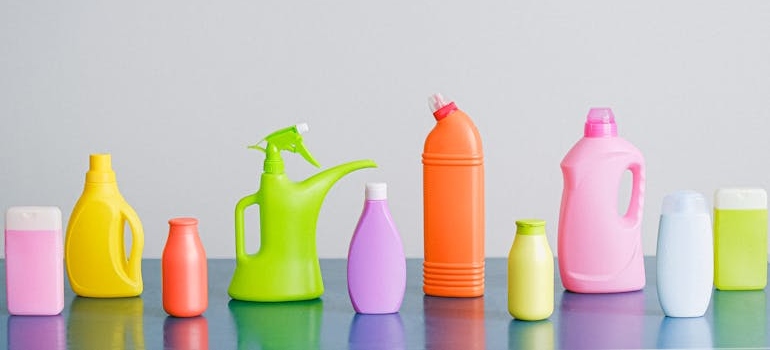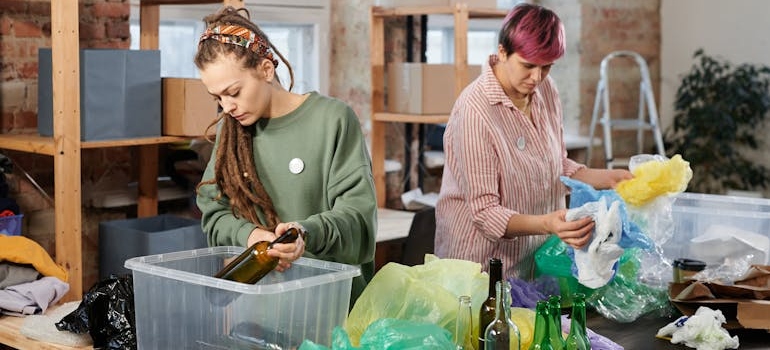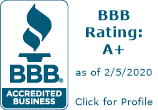Proper Disposal of HHW in Seattle Before Relocation
Proper disposal of hazardous household items is crucial for protecting public health and the environment. Hazardous household waste (HHW) includes products that can be dangerous if not handled correctly, such as chemicals, batteries, and certain electronic devices. In Seattle, there are specific guidelines and facilities dedicated to the safe disposal of these materials, which is especially important before relocating to ensure the safety of your new home and community. So, here’s everything you need to know about the disposal of HHW in Seattle before the Hansen Bros. Moving & Storage team arrives at your doorstep!
The Importance of Disposing of Hazardous Household Waste Before Moving
Disposing of hazardous household waste (HHW) before moving is crucial for several reasons. Firstly, HHW contains dangerous chemicals that can pose serious health risks if not handled properly, including the potential for fires, explosions, or toxic spills during transport. Movers typically do not transport hazardous materials due to these inherent risks and regulations that prohibit the transport of such items.
Therefore, it is the homeowner’s responsibility to ensure these items are disposed of safely before relocation. Additionally, accidents during transport could result in exposure to toxic substances, endangering the health of the movers and anyone else in proximity. When you ensure proper disposal of HHW before moving with Washington movers, you mitigate these risks, ensuring a safer move and protecting the environment and public health.

Understanding Hazardous Household Waste
Hazardous household waste comprises products used daily in homes that contain potentially harmful chemicals. These can include:
- Cleaning products: bleach, ammonia, and various disinfectants.
- Automotive products: motor oil, antifreeze, and brake fluids.
- Home improvement products: oil-based paints, solvents, and varnishes.
- Gardening products: pesticides, herbicides, and fertilizers.
- Miscellaneous: batteries, mercury thermometers, and fluorescent light bulbs.
These items should not be disposed of with regular trash or poured down the drain, as they can contaminate water supplies, soil, and air, posing risks to human health and the environment. Disposing of these items properly before booking moving services Seattle offers is essential to avoid transporting hazardous materials, which can be risky and—often illegal.
Seattle’s Approach to HHW Disposal
Seattle has implemented a comprehensive system to manage the disposal of hazardous household waste, ensuring that these items are handled safely and responsibly before residents move to new locations.
Permanent HHW Disposal Facilities
Proper disposal of hazardous household waste is essential to prevent environmental contamination and protect public health. Dangerous chemicals and materials, if not handled correctly, can leach into the soil and water or release harmful fumes, posing risks to both ecosystems and human health.
Seattle offers two main facilities for residents to dispose of hazardous waste:
- North Seattle Household Hazardous Waste Facility: Located at 12550 Stone Ave N, this facility is open Thursday to Saturday from 9:00 a.m. to 5:00 p.m. It accepts a variety of hazardous items, including aerosols, all-purpose cleaners, antifreeze, automotive fluids, batteries, and oil-based paints.
- South Seattle Household Hazardous Waste Facility: Situated at 8100 2nd Ave S, this facility operates Thursday to Saturday from 9:00 a.m. to 5:00 p.m. and is closed on major holidays. It provides services similar to those provided by the North Seattle facility, ensuring broad coverage across the city.
Both facilities have specific guidelines on the types and quantities of waste they accept. For instance, they typically allow up to 50 gallons of hazardous waste per residential customer per day, with some limitations on container sizes. Utilizing these facilities before relocation with cross-country movers in Seattle helps ensure that hazardous materials are not transported unnecessarily.
Mobile Collection Events
To increase accessibility, Seattle and King County also operate a mobile collection service known as the Wastemobile. This service travels to various locations throughout King County, providing temporary drop-off sites for hazardous waste. The Wastemobile schedule includes events in different neighborhoods, making it convenient for residents who may not live near a permanent facility.
These events accept a wide range of hazardous items, but there are specific restrictions and limits to the disposal of HHW in Seattle. For example, no marine flares are accepted, and there are quantity limits for items like fluorescent tubes, automotive fluids, and paint.
Special Disposal Programs
In addition to the permanent facilities and mobile collection events, Seattle participates in several specialized programs for specific types of hazardous waste:
- E-Cycle Washington: This program handles the disposal of electronic waste, such as computers, TVs, and other electronics. It ensures that these items are recycled responsibly, preventing harmful substances like lead and mercury from entering the environment.
- LightRecycle Washington: This initiative focuses on the disposal of fluorescent lights and other mercury-containing lamps. Residents can drop off these items at designated locations throughout the city.
- Safe Medication Return Program: This program provides a safe and convenient way to dispose of unused or expired medications, both prescription and non-prescription. It helps prevent the potential misuse of drugs and protects water supplies from pharmaceutical contamination.
Utilizing these programs before relocation ensures that you are not transporting potentially dangerous items and contributing to a safer environment in your new community!

General Guidelines for HHW Disposal
Proper disposal of hazardous household waste requires following specific guidelines to ensure safety and compliance with environmental regulations:
- Do not dispose of hazardous materials in regular trash: Many hazardous items can react with other waste, creating dangerous conditions such as fires, explosions, or toxic releases.
- Avoid pouring hazardous liquids down the drain: Chemicals can corrode plumbing, contaminate septic systems, and eventually reach water treatment plants, posing risks to both the environment and public health.
- Follow labeling and packaging instructions: When transporting hazardous waste to a disposal facility or collection event, label and package these items properly to prevent spills or leaks.
- Limit quantities: Most facilities have limits on the amount of hazardous waste they can accept from each customer. Check these limits beforehand.
Following these guidelines before moving helps to minimize the risks associated with transporting hazardous materials and ensures a safer transition to your new home.
Environmental and Health Impacts
Improper disposal of HHW in Seattle can have severe consequences for both human health and the environment. Chemicals from these products can leach into the soil and groundwater, contaminating drinking water supplies and harming wildlife. Airborne pollutants from improperly disposed waste can contribute to air quality issues, impacting respiratory health.
Persistent chemicals, such as per- and poly-fluorinated substances (PFAS), can accumulate in the environment and in human bodies over time. These chemicals are used in various household products and can persist for years, causing long-term environmental damage and potential health risks.
SMA residents can significantly reduce their impact on the environment and contribute to a healthier community simply by following proper disposal guidelines. Disposing of hazardous materials before moving is especially important, as it prevents transport and potential mishandling of these substances in a new location.
Community Involvement and Education
Seattle’s approach to hazardous waste disposal extends beyond facilities and programs. The city emphasizes community involvement and education to raise awareness about the importance of proper disposal practices, especially before relocating.
Public Outreach and Education
Seattle Public Utilities and King County regularly conduct outreach campaigns to educate residents about hazardous waste. These campaigns include workshops, informational brochures, and online resources that explain the types of hazardous waste, the risks associated with improper disposal, and the available disposal options.
School Programs
The city partners with local schools to incorporate environmental education into the curriculum. These programs teach students about the importance of reducing waste, recycling, and disposing of hazardous materials properly. Therefore, Seattle aims to foster a culture of environmental responsibility by instilling these values at a young age.
Volunteer Opportunities
The city offers various volunteer opportunities for residents to get involved in the disposal of HHW in Seattle and other environmental protection efforts. These include community clean-up events, hazardous waste collection drives, and educational outreach initiatives. Volunteers play a crucial role in spreading awareness and assisting with waste management efforts.

As easily as by engaging in these educational and volunteer opportunities, old and new residents can better understand the importance of proper hazardous waste disposal and how it impacts their community, particularly during times of relocation.
Future Directions
Seattle continues to explore innovative solutions to enhance its hazardous waste management system. Future initiatives may include:
- Enhanced Collection Services: Expanding the Wastemobile schedule and increasing the number of permanent drop-off sites to improve accessibility for all residents.
- Product Stewardship Programs: Collaborating with manufacturers to develop product stewardship programs, where producers take responsibility for the entire lifecycle of their products, including disposal.
- Advanced Recycling Technologies: Investing in advanced recycling technologies to safely and efficiently recycle hazardous materials, reducing the amount of waste that requires disposal.
- Policy Advocacy: Advocating for stronger state and federal regulations on hazardous materials to ensure comprehensive and uniform disposal practices across the region.
These initiatives aim to make hazardous waste disposal more accessible and efficient, ensuring that residents can easily dispose of these materials, especially before relocating.
Ensuring a Safer Move and Cleaner Environment
Proper disposal of hazardous household waste is a critical aspect of environmental protection and public health in Seattle. The city’s comprehensive system of permanent facilities, mobile collection events, specialized programs, and community education initiatives ensures that residents have the resources and knowledge to dispose of hazardous materials safely.
Seattle residents can contribute to a cleaner, safer, and more sustainable environment by adhering to these guidelines and participating in available programs before relocating with local movers Seattle trusts. Ensuring proper disposal of HHW in Seattle before moving not only protects the environment but also helps to maintain the safety and well-being of the new community you are joining.
Why Choose Us
History
Hansen Bros. Moving & Storage is locally owned and operated by the same family for four generations, since 1890. We have a well-established reputation for service quality and reliability with a high percentage of repeat household and commercial clients.
Professionalism
We’re a certified ProMover by the American Moving and Storage Association with A+ rating with the Better Business Bureau, voted “Best in Western Washington” in 2009 and from 2011 to 2016 by KING5. Our company is fully licensed and insured and member of WMC and AMSA.
Value
Hansen Bros. Moving & Storage provide free, no-obligation in-home estimate and competitive rates, including low minimum rates for shipments moving under 300 miles. We’ve set a refund policy for unused packing materials and three Puget Sound locations to help clients save on travel fee costs.



